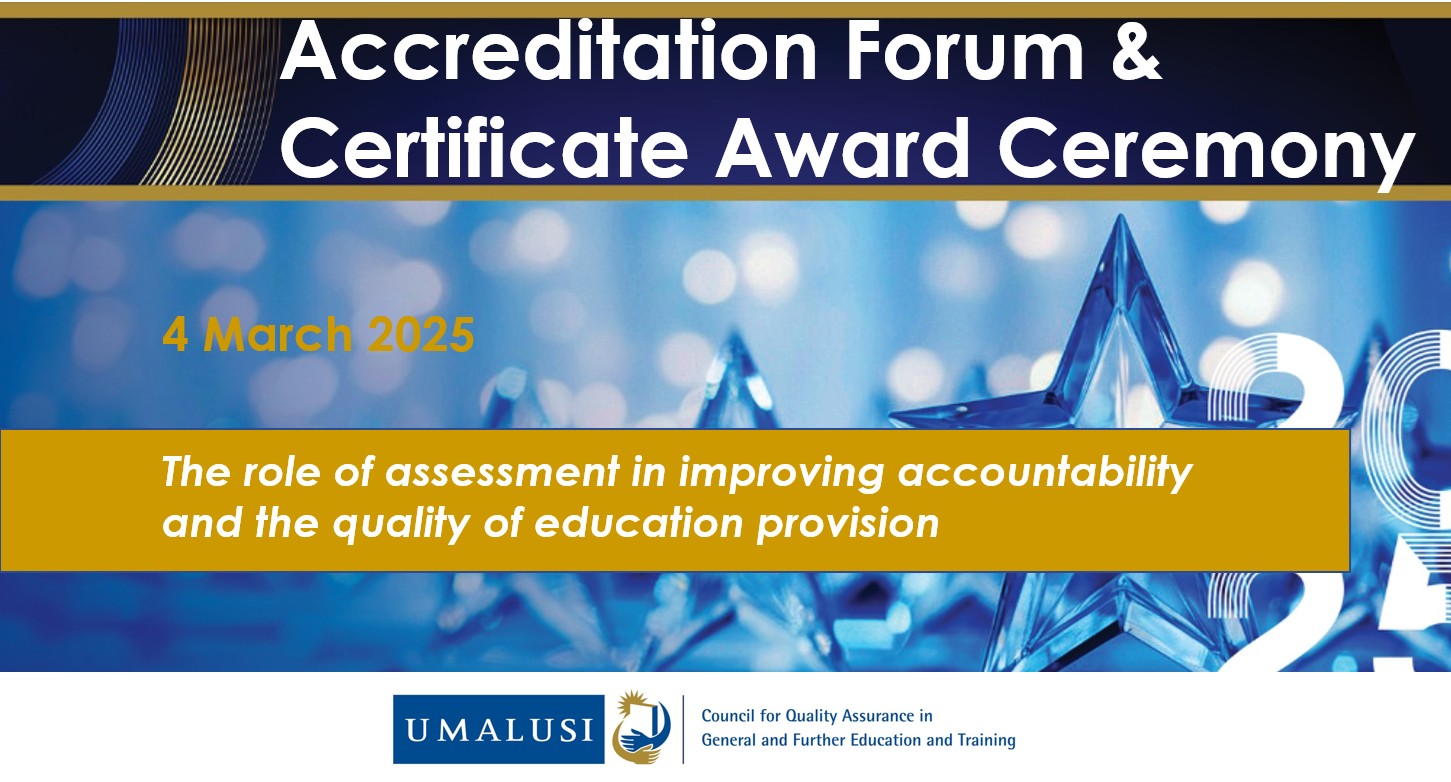Assuring the education standards in general and further education and training in South Africa
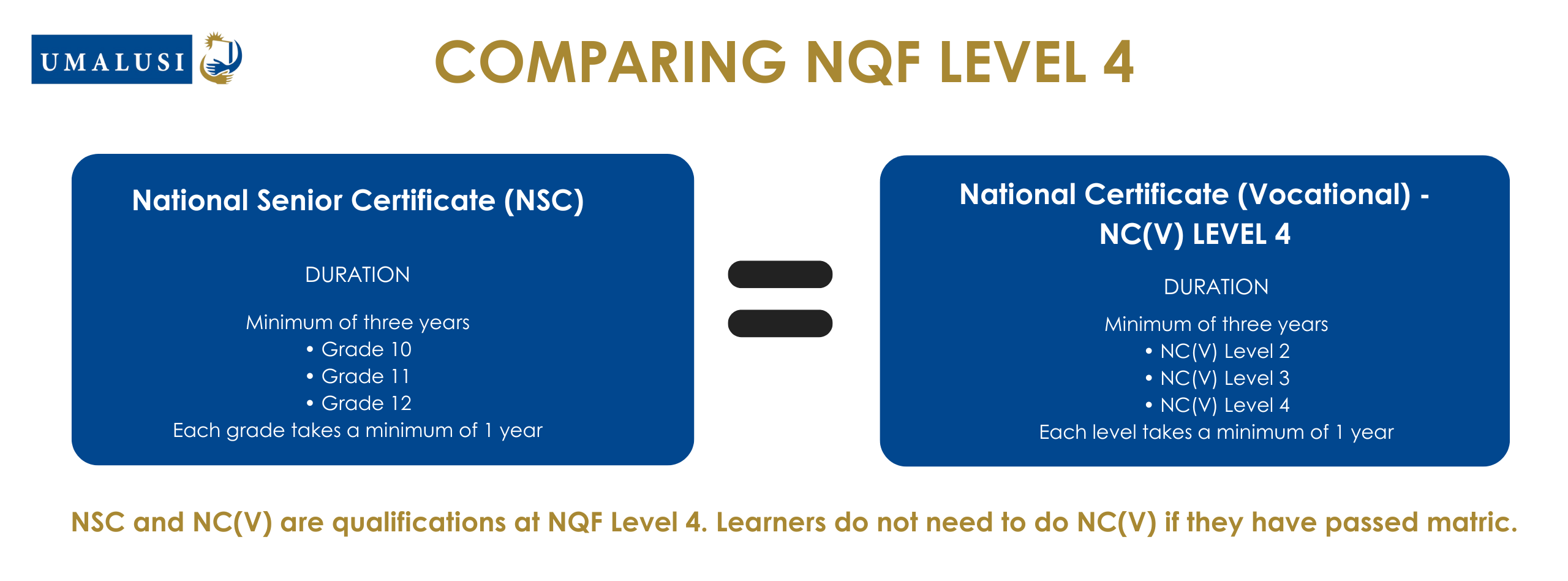
The Umalusi name
noun Shepherd | noun: herder
Umalusi is derived from Nguni and it means “shepherd or herder.”
Umalusi takes care of one of the nation`s most treasured
assets – the standards of general and further education and training, hence its name. In Nguni culture ‘Umalusi’ also means the guardian of the family`s wealth.
About Umalusi
We develop and manage a sub-framework of qualifications, maintaining high standards by developing, evaluating, and moderating qualifications and curricula. Our responsibilities also include accrediting education and training providers, conducting quality research, and verifying the authenticity of certificates.
Umalusi Council is committed to issuing credible, standard-compliant certificates to learners across the nation.
The Umalusi name
noun Shepherd | noun: herder
Umalusi is derived from Nguni and it means “shepherd or herder.”
Umalusi takes care of one of the nation`s most treasured
assets – the standards of general and further education and training, hence its name. In Nguni culture ‘Umalusi’ also means the guardian of the family`s wealth.
About Umalusi
We develop and manage a sub-framework of qualifications, maintaining high standards by developing, evaluating, and moderating qualifications and curricula. Our responsibilities also include accrediting education and training providers, conducting quality research, and verifying the authenticity of certificates.
Umalusi Council is committed to issuing credible, standard-compliant certificates to learners across the nation.
Umalusi Services
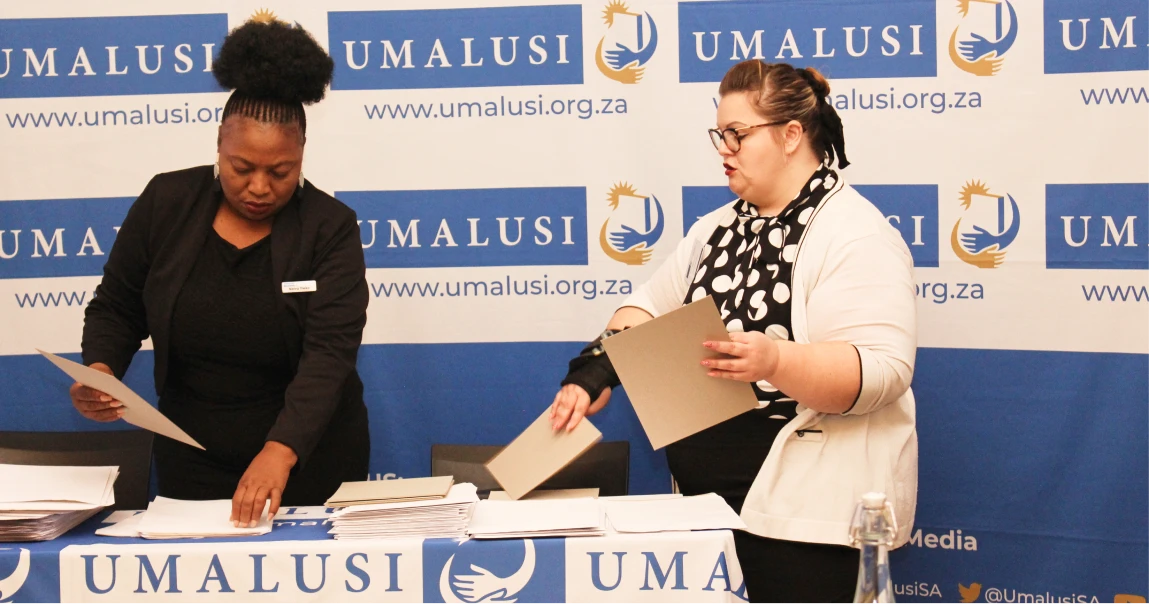
Accreditation of Institutions
Accreditation ensures that only the registered qualifications are offered by credible institutions and assessed by credible bodies.

Certification of Learners
This is the formal recognition of a qualification awarded to successful learners.

Qualifications
Umalusi appraises new qualifications and evaluates existing ones to ensure their relevance.

Quality Assurance of Assessments
This is undertaken to ensure that qualifications standards are maintained.

Verification of Qualifications
This is to establish the authenticity of qualifications and or certificates.
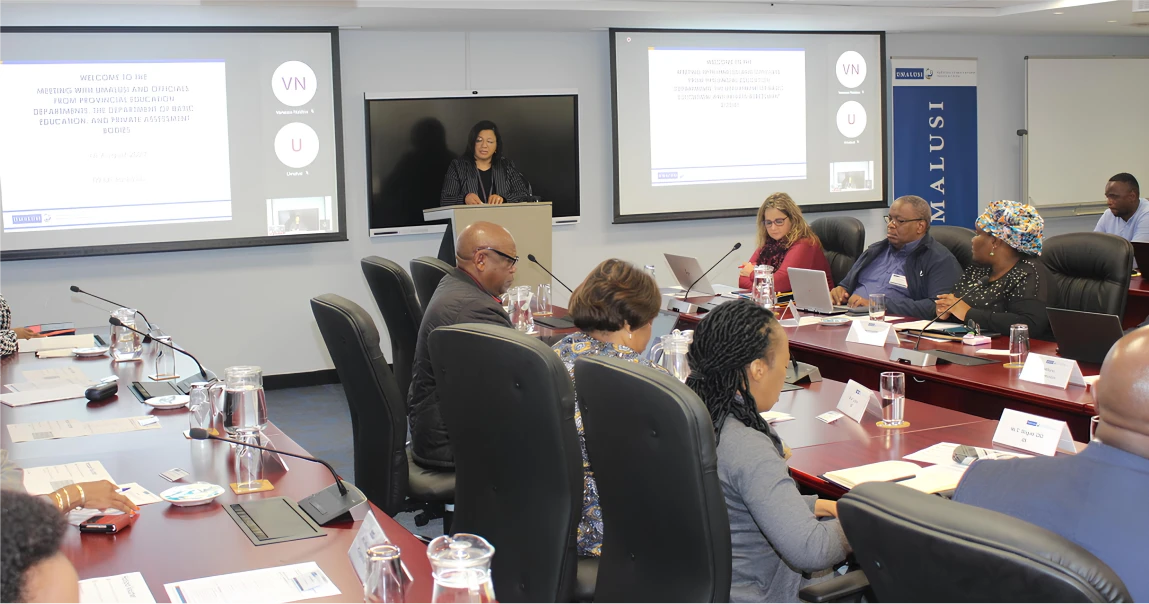
Standardisation of Learner Results
This mitigates the impact of factors other than learners’ knowledge and abilities on performance.
Umalusi Services

Accreditation of Institutions
Accreditation ensures that only the registered qualifications are offered by credible institutions and assessed by credible bodies.
Quality Assurance of Assessments
This is undertaken to ensure that qualifications standards are maintained.
Certification of Learners
This is the formal recognition of a qualification awarded to successful learners.
Verification of Qualifications
This is to establish the authenticity of qualifications and or certificates.
Qualifications
Umalusi appraises new qualifications and evaluates existing ones to ensure their relevance.
Standardisation of Learner Results
This mitigates the impact of factors other than learners’ knowledge and abilities on performance.Umalusi Publications
Reports
Newsletter
Makoya is an external newsletter that is published on a quarterly basis to inform stakeholders about new developments.
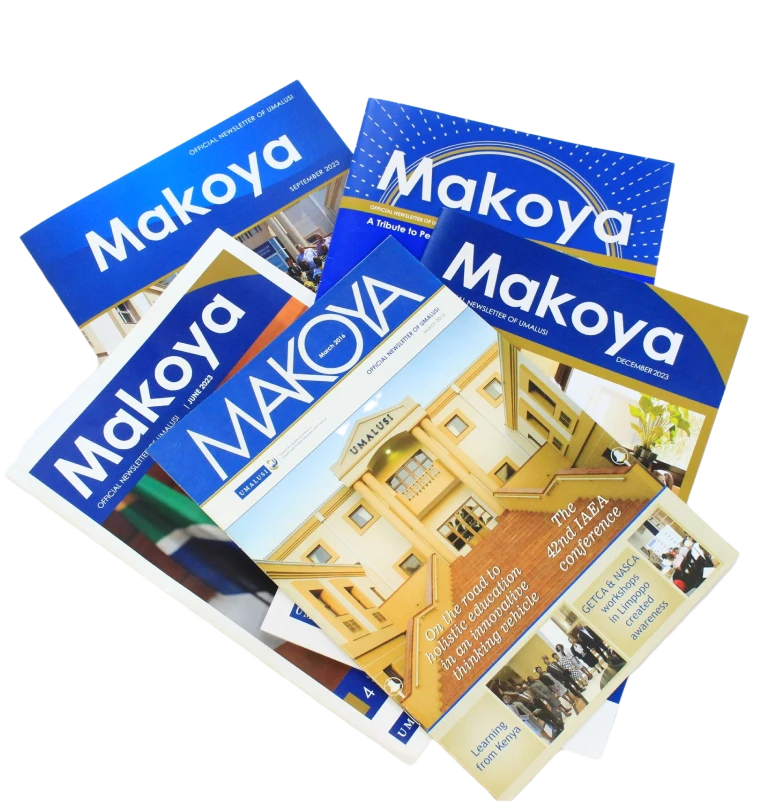
Certify and verify your educational achievements with Umalusi to ensure your qualifications are authentic.
Frequently Asked Questions
Accreditation
Certification and Verification
All N4-N6 Certificates must be verified by the Department of Higher Education and Training
Please note that Umalusi does not work directly with members of the public with regard to verification services. Individuals should apply through a verification agency for verification services, also refer to questions 1.20 and 1.21.
The Council has the responsibility for the issuing of the following certificates:
- Senior Certificate
- National Senior Certificate (FET colleges)
- National N3 Certificate
- Subject certificate
- General Education and Training Certificate
- Learning area certificate
- National Certificate (Vocational)
- National Senior Certificate (Schools)
- Subject statement
Please visit our website at www.umalusi.org.za under the verification heading for the names of agencies that have contracts with Umalusi. There are a number of other verification agencies which are not listed, but which have contracts with Umalusi, that can also be contacted. You are not limited to using an agency listed on the website.Please note: Agencies charge varying fees for verification services. You are therefore advised to request prices from more than one agency before requesting the verification of your qualifications.
Umalusi verifies certificates issued from November 1992. All certificates issued before November 1992 must be verified by the Departments of Basic Education and Higher Education and Training (N3).
Umalusi verifies the National Senior Certificate, Senior Certificate, General Education and Training Certificate (GETC) for adults and N3 certificates and National Certificate (Vocational) (NCV)
Yes, through any assessment body where you wrote according to certain regulated rules of combination.
What are the pass requirements for the National Senior Certificate if I want entrance to university?
The National Senior Certificate will be awarded to you if you have complied with the following requirements which form the basis for determining pass requirements to be accepted at University for the Higher Certificate, Diploma or Degree Studies programmes:
To obtain a National Senior Certificate you must have offered a minimum of seven subjects in the examination:
Subjects
One Home Language
One Home or First Additional Language
Mathematics or Mathematical Literacy
Life Orientation
3 x subjects selected from Group B
and further fulfil the minimum promotion requirements, viz:
- achieve 40% in three subjects, one of which is an official language at Home Language level;
- achieve 30% in three other subjects; and
- provide full evidence in the School-Based Assessment component of the subjects they offer.
To qualify for admission to Higher Certificate studies you need to pass Home Language at a minimum of 40% 40% in two other subjects and 30% in three other subjects.
To qualify for admission to Diploma Studies at a University, you need to pass the National Senior Certificate, with an achievement rating of 3 (moderate achievement, 40%-49%) or better in four recognised NSC 20-credit subjects, and a minimum 30% in the language of learning and teaching of the Higher Education institution concerned.
To qualify for admission to Bachelor`s Degree studies at a University, you need to pass with a minimum of 30% in the language of learning and teaching of the Higher Education institution concerned, in addition to an achievement rating of 4 (adequate achievement, 50%-59%) or better in four subjects
If you are already in possession of a National Senior Certificate, combination is possible only if through the improvement of your results the status of the certificate changes e.g. a new certificate can be obtained if the old certificate allows access only to a Diploma but with the improvement you are now eligible for access to a Bachelor's degree studies.
Unfortunately not. The National Senior Certificate is granted according to specific rules of combination and therefore one has to write the matric to get a matric.
No, Umalusi is not an assessment body. For supplementary exams please register with an assessment body (Either a provincial department of education or the Independent Examinations Board (IEB) or SACAI
A candidate who did not qualify for a full certificate is issued with a subject certificate/subject statement/learning area certificate for the subjects passed. A subject certificate/subject statement/learning area certificate is also issued to candidates who have rewritten and improved their results in a given subject.
Umalusi does not evaluate foreign qualifications. Please contact the South African Qualifications Authority through their website at www.saqa.org.za
A change of personal details due to a marriage or civil union or arising from the situation where a person has changed his or her name through a legal process after the issuing of a certificate do not qualify for a re-issue.
The only changes to personal particulars that are considered once the window period of one year from the certification date has elapsed are:
- Your ID number has changed due to an error by Home Affairs where you and another person were issued with the same ID number. You will be required to submit the original certificate as well as the letter from Home Affairs indicating the change. Application must be made at any of the Departments of Education.
- Your ID number has changed due to an error made by Home Affairs in respect of gender. You will be required to submit your original certificate (not a replacement), copies of the old and new ID document and the letter from Home Affairs indicating the change in ID number. You must submit your application at one of the Departments of Education.
- Your gender, your names and ID number have been changed.
Please send an e-mail to verification@umalusi.org.za or telephone 012 349 1510 for particulars on how to go about this, as these can differ.
You will need to make a payment to Umalusi and then send certified copies of your ID document or passport as well as your certificate (not older than 3 months) to verification@umalusi.org.za with Authentication for the DIRCO in the subject line. Fees vary from year to year. The applicable fees can be requested from Umalusi by sending an e-mail to verification@umalusi.org.za
New qualifications
The National Senior Certificate for Adults (NASCA)
The General Education and Training Certificate for Adults (GETCA)
Within the six month period after certification, but not later than a year after the examination, Umalusi will consider a request for a re-issue.
Administrative Errors
Within the six month period after certification, but not later than a year after the last examination, Umalusi will consider a request for a re-issue in the following cases where there is sufficient proof that the mistake on the certificate, either with regard to a subject mark, subject choice or a change in result, or some aspect of the personal details, is incorrect because of a registration error by the school or the assessment body. Such a request will be considered, if it is submitted within a six month period after the issuing of the certificate to the candidate, but not later than a year after the examination.
The following procedure is required in an application for a re-issue
- the request for a re-issue must be made through an assessment body;
- the original certificate must be returned; and
- A change to an original certificate will not be considered unless the original certificate (not a replacement) is returned.
Re-issue: Legal alteration of personal details
A change of personal details due to a marriage or civil union or arising from the situation where a person has changed his or her name through a legal process after the issuing of a certificate do not qualify for a re-issue.
Yes, the assessment body where you apply for a replacement of your lost certificate can supply you with a confirmation letter to indicate that you are in the process of applying for a replacement certificate and confirm your qualification and results.
No, Umalusi does not issue letters of achievement if you have lost your certificate. Such a letter may be issued by the Department of Education when you apply for your lost certificate.
Umalusi is responsible for the replacement of the Senior Certificate and National Senior Certificate as from September 1992.
To apply for a replacement (in lieu of a lost certificate) of your matric/Gr12 certificate the following is required:
- A completed application form, which can be obtained at any of the departments of education or on the website of the National Department of Basic Education (www.education.gov.za)
APPLICATIONS FORMS MUST BE COMPLETED TAKING CARE OF THE DETAIL REQUIRED, E.G. YEAR QUALIFICATIONS OBTAINED, SURNAME AND NAMES UNDER WHICH THE PERSON QUALIFIED FOR THE CERTIFICATE AND WHERE POSSIBLE THE SCHOOL NAME.
APPLICATIONS FOR LOST CERTIFICATE / RE-ISSUES CAN BE DONE AT ANY OF THE DEPARTMENTS OF EDUCATION, IRRESPECTIVE OF WHERE YOU WROTE YOUR MATRIC, FOR EXAMPLE, IF YOU HAVE WRITTEN THE EXAM IN A SCHOOL IN EASTERN CAPE, YOU CAN APPROACH THE MPUMALANGA DEPARTMENT OF EDUCATION FOR A REPLACEMENT CERTIFICATE.
- An affidavit – All applications for replacement of lost/damaged certificates should be accompanied by a signed affidavit from a police station stating the status of the original certificate e.g. stolen; lost in a move.
IT SHOULD BE NOTED THAT THE PREVIOUS CERTIFICATE IS CANCELLED WHEN A REPLACEMENT CERTIFICATE IS ISSUED.
- A certified copy of the candidate`s identity document is required. (This copy must be certified by a commissioner of oaths. A copy can be made and certified either at a police station or at an attorney`s office where they should do it for free.)
- Proof of payment of administration fees – An administration fee is payable with a request for a certificate. The fee payable can be established with the accredited assessment body. The fee is reviewed on an annual basis.
Please note the following important information:
A certificate cannot be issued on the same day that the application is submitted. The processing time is 4 – 6 weeks under normal circumstances.
A request for replacements for certificates obtained prior to November 1992 can be made from the office of any of the Departments of Education.
Presently Umalusi Council issues the following certificates:
Schooling qualifications:
The Senior Certificate (SC) which was offered before 2008
The National Senior Certificate (NSC) which replaced the Senior Certificate in schools and commenced in 2008
The Amended Senior Certificate, which will be written for the first time in June 2014
TVET/FET qualifications:
The National N3 Certificate
The National Senior Certificate: Colleges – phased out in 2011, but still certified for candidates combining the National N3 Certificate with two languages; this option will be phased out once the Amended Senior Certificate is offered
The National Certificate: Vocational (NCV) Levels 2 – 4 – commenced in 2007, 2008 and 2009 respectively
Adult Education and Training qualifications;
The General Education and Training Certificate for Adults (GETC: ABET)
Yes, you can improve the status of a certificate issued to you, taking into consideration the minimum higher education admission requirements, e.g. from a National Senior Certificate with access to Diploma Studies to access to Bachelors Degree studies, by completing the outstanding requirements. A new certificate, taking into consideration the requirements will be issued, if this does not exceed a maximum of 3 examination sittings.
We either refund you or keep the money for a future verification request. Umalusi only verifies certificates that were issued after 1992. Certificates issued earlier must be verified by the respective department of education. However, in order to avoid such incidents you are advised to confirm the examination date before making payment.
Yes. Umalusi has records of all Senior Certificates from 1992 and will continue to issue the Senior Certificate for replacement purposes.
Presently Umalusi Council issues the following certificates:
Schooling qualifications:
The Senior Certificate (SC) which was offered before 2008 and is being phased out – its final examination will be administered in 2014
The National Senior Certificate (NSC) which replaced the Senior Certificate and commenced in 2008
Vocational qualifications:
The National Technical Certificate N3
The National Senior Certificate: Colleges – phasing out by the end of 2011
The National Certificate: Vocational (NCV) – commenced in 2007
Adult Education and Training qualifications;
The General education and Training Certificate for adults (GETC: ABET)
Umalusi is responsible for the replacement of the Senior Certificate and National Senior Certificate as from September 1992.
NOTE: Applications for lost or replacement certificates must be done directly with Umalusi by clicking here.
The following documents are required when applying:
- An affidavit – All applications for replacement of lost/damaged certificates should be accompanied by a signed affidavit from a police station stating the status of the original certificate e.g. stolen; lost in a move.
- A certified copy of the candidate’s identity document is required. (This copy must be certified by a commissioner of oaths. A copy can be made and certified either at a police station or at an attorney’s office where they should do it for free).
- Payment is done online. You will be required to pay an additional fee should you wish to have your certificate delivered to you. Fees are reviewed on an annual basis.
Applications for lost certificate / re-issues can also be done at any of the Departments of Education, irrespective of where you wrote your matric, for example, if you have written the exam at a school in Eastern Cape, you can approach the Mpumalanga Department of Education for a replacement certificate. Please contact them or visit your District/local office for more information. This statement is in exception of IEB and SACAI, as lost certificates can only be applied from them.
- An affidavit – All applications for replacement of lost/damaged certificates should be accompanied by a signed affidavit from a police station stating the status of the original certificate e.g. stolen; lost in a move.
- A certified copy of the candidate’s identity document is required. (This copy must be certified by a commissioner of oaths. A copy can be made and certified either at a police station or at an attorney’s office where they should do it for free).
- Proof of payment of administration fees – An administration fee is payable with a request for a certificate. The fee payable can be established with the accredited assessment body. The fee is reviewed on an annual basis.
- An electronic request must be submitted to Umalusi by the Assessment Body after processing an application form. This request should be sent in a form of a dataset as stipulated by the Council.
It should be noted that the previous certificate is cancelled when a replacement certificate is issued. Should it happen that a candidate finds a certificate that was lost/replaced, then the candidate should know that the certificate is invalid.
Please note the following important information:
A certificate cannot be issued on the same day that the application is submitted. The processing time is 1 – 6 weeks under normal circumstances.
A request for replacements of certificates obtained prior to November 1992 can be made from the office of any of the Departments of Education and the same procedure followed. However, it should be noted that this certificate will be printed by the relevant Assessment Body and not Umalusi. The processing time is 1 to 3 weeks under normal circumstances.
Contact details for the various provincial and National Departments are as follows:
| EASTERN CAPE EDUCATION DEPARTMENT Exam Centre 30 Durban Street King Williams’s Town 5600 Tel: 043 604 7724 |
FREE STATE EDUCATION DEPARTMENT 55 Elizabeth Street, 1st Floor Fidel Castro Building, Bloemfontein Tel: 051 404 8252 |
| GAUTENG EDUCATION DEPARTMENT 111 Commissioner Street Johannesburg Tel: 011 355 0611 |
KWAZULU-NATAL EDUCATION DEPARTMENT 72 Stanger Street Malgate Building Durban Tel: 031 327 0312 |
| MPUMULANGA EDUCATION DEPARTMENT Beta Building SADC Street Middelburg Tel: 013 766 0051 |
NORTHERN CAPE EDUCATION DEPARTMENT Buckley road Ex-Perseverance college Kimberley Tel: 053 839 6503 |
| LIMPOPO EDUCATION DEPARTMENT crn 113 Biccard & 24 Excelsior Polokwane Tel: 015 290 7740 |
NORTH WEST EDUCATION DEPARTMENT 90 Van Der Hoff Potchefstroom Tel : 018 388 0827 |
| WESTERN CAPE EDUCATION DEPARTMENT Grand Central Towers Lower Parliament Street cape town Tel: 021 467 2936 |
DEPARTMENT OF BASIC EDUCATION 222 Struben Street Sol Plaatjie building Pretoria Central Tel: 012 357 3255 |
| DEPARTMENT OF HIGHER EDUCATION 222 Struben Street Sol Plaatjie building Pretoria Central Tel: 012 357 3255 |
SACAI 278 Serene Street Garsfontein 0042 Tel: 012 348 5650 info@sacai.org.za |
| I.E.B Contact:
Email: assess@ieb.co.za Tel: 011 483 9773
|
ERCO Certification@umalusi.org.za |
Assessments
In terms of the GENFETQA Act of 2001(as amended in 2008), Umalusi is required to approve the release of results once it is satisfied that the examinations have been conducted in a credible manner. The Act also indicates that Umalusi is permitted to adjust the raw marks when necessary.
Gaining the approval of the Umalusi Council for the release of the results is a complex process, of which standardization is one of the last steps. Approval of results is determined by how well the assessment bodies responsible for the examinations have complied with all the policies, directives and guidelines related with the qualification being resulted.
These policies and directives are issued by Umalusi and the Departments of Basic Education and Higher Education and Training, and also by the Independent Examinations Board (IEB) and SACAI: (South African Comprehensive Assessment Institute) for their own systems. Such approval is also dependent on whether any irregularities could be considered to have undermined the credibility and integrity of the examinations.
Standardisation is a process used the world over to mitigate the effect of factors other than the learners` knowledge and aptitude on the learners` performance. In South Africa, the standardisation of results has been used since 1918 by Umalusi's predecessors, the Joint Matriculation Board (JMB) (1918-1992) and South African Certification Council (SAFCERT) (1992-2001). In other words, all South Africans who have obtained their qualifications through these bodies have had their subjects standardised prior to their results being announced.
A large-scale examination system such as the National Senior Certificate (NSC) inevitably experiences many sources of variability, despite the best efforts of examiners, markers and moderators. These can include changes in levels of difficulty in question papers across years: so, for example, one year's Mathematics papers may be more difficult than the ones in the preceding years, and so, to prevent that cohort from being unduly disadvantaged, their marks may be adjusted marginally towards the historical average. Variability may also result when errors occur in papers, and inconsistency may arise in the marking, for example, across provinces.
Standardisation works on the widely accepted assumption that, for large populations, the distribution of aptitude and intelligence does not change appreciably from one year to the next or from one large population to a similarly large population; and that it is therefore reasonable to expect that, all things being equal, this year's cohort of learners should perform at a level more or less comparable to last year's cohort. Standardisation is the accepted process used to reduce fluctuations in learner performance that result from identified factors within the examination processes themselves rather than from the knowledge, aptitude and abilities of the learners.
Prior to 2010, the standardisation decisions were treated as confidential. All international assessment bodies treat this information as confidential. In 2010, Umalusi took the decision to disclose the standardisation process and standardization decisions to take the public into confidence by demonstrating the integrity of the process.
Who is involved in standardisation?
Standardisation is a process where Umalusi, as the quality assuror takes into account – on a subject-by-subject basis – all the factors which may have unduly advantaged or disadvantaged the cohort of learners under consideration.
While Umalusi`s Quality Assurance of Assessment (QAA) unit is primarily responsible for the ongoing quality assurance work, it works closely with a committee of Umalusi Council, the Assessment Standards Committee. This committee is responsible for the standardisation and moderation of internal assessment results as well as the examination results for all qualifications that Umalusi certifies.
The Assessment Standards Committee comprises statisticians with relevant experience and knowledge in the handling of statistically-oriented research projects, research design, the conduct and evaluation of research projects and statistical standardisation processes.
It also includes professionals in education with specific knowledge, experience and expertise in assessment and curriculum, and in handling of system-wide assessment research projects.
Standardisation is a process where Umalusi, as the quality assuror takes into account – on a subject-by-subject basis – all the factors which may have unduly advantaged or disadvantaged the cohort of learners under consideration.
While Umalusi's Quality Assurance of Assessment (QAA) unit is primarily responsible for the ongoing quality assurance work, it works closely with a committee of Umalusi Council, the Assessment Standards Committee. This committee is responsible for the standardisation and moderation of internal assessment results as well as the examination results for all qualifications that Umalusi certifies.
The Assessment Standards Committee comprises statisticians with relevant experience and knowledge in the handling of statistically-oriented research projects, research design, the conduct and evaluation of research projects and statistical standardisation processes.
It also includes professionals in education with specific knowledge, experience and expertise in assessment and curriculum, and in handling of system-wide assessment research projects.
How does the standardization process work? How does standardisation happen?
In order to guide the final standardisation meetings with each of the assessment bodies – the Department of Basic Education, the Department of Higher Education and Training, ERCO and the IEB – the Assessment Standards Committee holds pre-standardisation meetings. There it receives, among other things,
- Detailed analyses of the question papers in terms of their compliance with prescribed subject assessment guidelines (SAGs);
- Detailed analyses of the question papers in terms of their cognitive levels;
- Comparative analyses of the current year`s question papers in relation to the question papers of the previous years;
- Input from internal moderators and chief markers
- Input by Umalusi's evaluators and external moderators, as well as verification of the quality of the marking.
It then deliberates on the preliminary results submitted by the relevant assessment body, and, in the light of all reports received, decides upon a course of action – to accept the raw marks (always the preferred option as it means that the other moderation processes have functioned well), or to consider an adjustment to the marks.
At the standardisation meetings, delegations from the assessment bodies present their understanding of the subject results for Umalusi's consideration. Unless the assessment body presents new information regarding a factor that has not been considered in the pre-standardisation meeting – one which is felt to impact on the validity of the examination results – the decision taken at pre-standardisation stands.
At the standardisation meeting of the National Senior Certificate, for example, the delegation of the Department of Basic Education is led by the Director General. The delegation from the Department includes executive and senior managers of the Department as well as the Heads of Provincial Departments of Education and their senior managers. A similar delegation from the Department of Higher Education and Training works with Umalusi in the resulting of the National Certificate (Vocational). Each of these teams will have had their own pre-standardisation meetings to prepare for the meeting with Umalusi. The ERCO and the IEB delegations will have done the same.
Observers from the South African Qualifications Authority (SAQA), Higher Education South Africa (HESA), the South African Council of Educators (SACE) and all the teacher unions are invited to attend. In addition, colleagues from other examination boards or councils elsewhere in Africa are invited to attend as observers.
During the standardisation meetings, Umalusi and the assessment body concerned deal with the results on a subject-by-subject basis. In other words, it is not possible at that meeting to establish what the overall pass rate will be. The final pass rate will emerge only once the results for the individual candidates have been compiled – a job that can only happen after standardisation has been completed and the standardisation decisions effected.
At the standardisation meeting, the assessment body is allowed to make a case for adjusting the marks for a subject or recommends that the raw marks be accepted as final. Umalusi's Assessment Standards Committee then may interrogate the position proposed by the assessment body, and then makes its decision in the light of all the information available to it.
In order to guide the final standardisation meetings with each of the assessment bodies – the Department of Basic Education, the Department of Higher Education and Training, Independent Examinations Board, South African Comprehensive Assessment Institute and Benchmark Assessment Agency – the Assessment Standards Committee holds pre-standardisation meetings. There it receives, among other things,
- Detailed analyses of the question papers in terms of their compliance with prescribed subject assessment guidelines (SAGs);
- Detailed analyses of the question papers in terms of their cognitive levels;
- Comparative analyses of the current year`s question papers in relation to the question papers of the previous years;
- Input from internal moderators and chief markers
- Input by Umalusi's evaluators and external moderators, as well as verification of the quality of the marking.
It then deliberates on the preliminary results submitted by the relevant assessment body, and, in the light of all reports received, decides upon a course of action – to accept the raw marks (always the preferred option as it means that the other moderation processes have functioned well), or to consider an adjustment to the marks.
At the standardisation meetings, delegations from the assessment bodies present their understanding of the subject results for Umalusi's consideration. Unless the assessment body presents new information regarding a factor that has not been considered in the pre-standardisation meeting – one which is felt to impact on the validity of the examination results – the decision taken at pre-standardisation stands.
At the standardisation meeting of the National Senior Certificate, for example, the delegation of the Department of Basic Education is led by the Director General. The delegation from the Department includes executive and senior managers of the Department as well as the Heads of Provincial Departments of Education and their senior managers. A similar delegation from the Department of Higher Education and Training works with Umalusi in the resulting of the National Certificate (Vocational) and the General Education and Training Certificate for Adults (GETC). Each of these teams will have had their own pre-standardisation meetings to prepare for the meeting with Umalusi. The SACAI, Benchmark and IEB delegations will have done the same.
Observers from the South African Qualifications Authority (SAQA), Universities South Africa(USaF), the South African Council of Educators (SACE) and all the teacher unions are invited to attend. In addition, colleagues from other examination boards or councils elsewhere in Africa are invited to attend as observers.
During the standardisation meetings, Umalusi and the assessment body concerned deal with the results on a subject-by-subject basis. In other words, it is not possible at that meeting to establish what the overall pass rate will be. The final pass rate will emerge only once the results for the individual candidates have been compiled – a job that can only happen after standardisation has been completed and the standardisation decisions effected.
At the standardisation meeting, the assessment body is allowed to make a case for adjusting the marks for a subject or recommends that the raw marks be accepted as final. Umalusi’s Assessment Standards Committee then may interrogate the position proposed by the assessment body, and then makes its decision in the light of all the information available to it.
Once the Assessment Standards Committee is satisfied that candidates have been fairly treated and that the results are a fair reflection of the cohort's performance on that particular set of examinations, it recommends to Council that it approve the results, and that they may be released by the Minister concerned.
- Standard setting through development and implementation of assessment policies and directives
- Moderation of the standards of examination papers
- Moderation of the standards of internal assessment
- Monitoring the administration of national examinations and marking processes
- Moderation of the standard of marking
- Monitoring and verification of resulting
- Standardisation of results and approval of results for release
Umalusi is the Quality Council responsible for setting standards and quality assuring qualifications for general and further education and training. As such it has developed a sub-framework of qualifications which consists of existing qualifications and proposals for some new qualifications. The existing qualifications that are assessed through national examinations are as follows:
Schooling qualifications:
The Amended Senior Certificate (ASC)
The National Senior Certificate (NSC)
Vocational qualifications:
The National Technical Certificate N3
The National Certificate: Vocational (NCV)
Adult Education and Training qualifications;
The General Education and Training Certificate for Adults (GETC: ABET)
Qualifications
Umalusi is established as the Council for Quality Assurance in General and Further Education and Training by the General and Further Education and Training Quality Assurance (GENFETQA) Act No. 58 of 2001 as amended. In addition, the National Qualifications Framework (NQF) Act No. 67 of 2008 mandates Umalusi to develop and to manage its sub-framework, the General and Further Education and Training Qualifications Sub-Framework (GFETQSF).
The following Acts are some of the pieces of legislation that guide Umalusi in the provision of education in general and further education and training:
- The Constitution of the Republic of South Africa, 1996 (Act No. 108 of 1996)
- Continuing Education and Training (CET) Act, 2006 (Act No. 16 of 2006)
- National Education Policy Act, 1996 (Act No. 27 of 1996)
- South African Schools Act, 1996 (Act No. 84 of 1996)
The South African education system is organised into a single comprehensive qualifications framework, known as the National Qualifications Framework (NQF). The NQF is a comprehensive system approved by the Minister for the classification, registration, publication, and articulation of quality-assured national qualifications. The NQF comprises three qualifications sub-frameworks, namely, the:
- General and Further Education and Training Sub-framework (GFETQSF) for which Umalusi is responsible,
- Occupational Qualifications Sub-framework (OQSF), overseen by the Quality Council for Trades and Occupations (QCTO); and
- Higher Education Qualifications Sub-framework (HEQSF), overseen by the Council on Higher Education.
The GFETQSF is one of the three (3) sub-frameworks that make up the NQF. Qualifications registered on the GFETQSF are those qualifications that have been evaluated to be at Levels 1 – 4 of the NQF, that are general and vocational in nature. The GFETQSF qualifications are intended for the schooling and post-schooling system as offered in public and independent schools Technical and Vocational Education and Training (TVET) colleges and private colleges, as well as Adult Education and Training (AET) centres.
SAQA is an agency of government responsible for overseeing the NQF and coordinating the three sub-frameworks of the NQF, i.e., the GFETQSF, OQSF, and the HEQSF. As a Quality Council, Umalusi ensures that qualifications and part-qualifications are developed and evaluated before they can be recommended to SAQA for registration on the GFETQSF of the NQF. It is only SAQA that registers, deregisters, and/or updates qualifications and part-qualifications on the NQF as per recommendations from the Quality Council responsible for that qualification and part-qualification.
The following qualifications are registered on the GFETQSF of the NQF and are overseen by Umalusi:
- General Education and Training Certificate: Adult Basic Education and Training (GETC: ABET), NQF Level 1 (SAQA ID 73249)
- National Senior Certificate (NSC), NQF Level 4 (SAQA ID 49647)
- National Certificate (Vocational) [NC(V)], NQF Level 2 (SAQA ID 50440)
- National Certificate (Vocational) [NC(V)], NQF Level 3 (SAQA ID 50442)
- National Certificate (Vocational) [NC(V)], NQF Level 4 (SAQA ID 50441)
- Senior Certificate (SC), NQF Level 4 (SAQA ID 15947)
- National Senior Certificate for Adults (NASCA), NQF Level 4 (SAQA ID 91672)
- General Education and Training Certificate for Adults (GETCA), NQF Level 1 (SAQA ID 97519)
The NASCA and the GETCA are qualifications that are currently under development, and thus, not ready for implementation. The public can determine and/or verify the status of each of the Umalusi qualifications through Umalusi, or through the SAQA website, using either the registered name of the qualification or the SAQA ID on this link https://allqs.saqa.org.za/search.php?cat=qual.
- Umalusi must develop, foster, and maintain a sub-framework of qualifications for general and further education and training;
- Umalusi must ensure that its sub-framework articulates with other sub-frameworks in the education and training system to form an integrated and transparent national framework for the recognition of learning achievements; and
- Ensure that the qualifications on its sub-framework are internationally comparable and of an acceptable quality.
Umalusi derives its mandate from the NQF Act No 67 of 2008, the National Education Policy Act No 27 of 1996 and its founding act the General and Further Education and Training Quality Assurance Act No 52 of 2001 amended in 2008. Umalusi is also guided by the South African Schools Act No 84 of 1996; the FET Colleges Act No 16 of 2006 amended 2011; the Adult Basic Education and Training Act No 52 of 2000 amended 2010 as well as the various policies issued by the Ministers of Education in respect of accreditation of private providers and assessment bodies and the various qualifications Umalusi certifies. Umalusi is further guided by its own policies:
- The General and Further Education and Training Qualifications Framework; and
- Standard Setting and Quality Assurance for the General and Further Education and Training Qualifications Framework.
The NQF Act mandated SAQA with the development and articulation of the NQF and created three quality councils, namely Council on Higher Education, Umalusi the council for Quality Assurance of General and Further Education and Training, and the Quality Council for Trades and Occupations, each responsible for a sub-framework of qualifications within an integrated National Qualifications framework. Umalusi is the Quality Council that must ensure that quality is achieved in the delivery of the outcomes of general and further education training in the national education and training system – this means in schools, FET colleges, adult learning centres and assessment bodies that examine qualifications in general and furthered education (NQF 1-4). As such Umalusi sets standards for general and further education and training through the development and management of a sub-framework of qualifications for the sector, and the implementation of the appropriate quality assurance processes.
The NATED N1 – N3 Engineering programmes are pre-2009 part-qualifications that were inherited by Umalusi, offered in TVET colleges. These include the:
- National Certificate: N1 Engineering Studies, NQF Level 1 (SAQA ID 67109)
- National Certificate: N1 Engineering Studies, NQF Level 2 (SAQA ID 61375)
- National Certificate: N1 Engineering Studies, NQF Level 3 (SAQA ID 67491)
The NATED N1 – N3 Engineering programmes are being phased out, as per the Ministerial Determination of the Sub-Frameworks, Gazette No. 44031 of 24 December 2020. The last examination for NATED N1 was August 2024, for NATED N2 was April 2025, and for NATED N3 is November 2025. Although the programmes will no longer be offered, Umalusi will still be able to replace NATED N3 certificates that are lost or damaged, through the certificate replacement process.
Assessment bodies, formerly known as examination boards, are entities responsible for designing, conducting, and managing examinations that lead to the awarding of qualifications by Umalusi. The assessment bodies include the Department of Basic Education (DBE), the Department of Higher Education and Training (DHET), and two (2) Umalusi-accredited private assessment bodies, namely the South African Comprehensive Assessment Institute (SACAI) and the Independent Examinations Board (IEB). Each of the above-mentioned assessment bodies is responsible for assessing the different GFETQSF qualifications as shown in the diagram below:
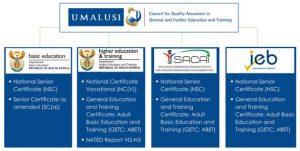
Not at all. The IEB and SACAI do not have their own qualifications and thus, cannot issue certificates. Accredited private assessment bodies are responsible for assessing qualifications for which they are accredited, which are registered on the NQF. Umalusi quality assures all assessments written at the exit point of each qualification, for all assessment bodies, and issues certificates of learning achievement to qualifying candidates. There is only one NSC, NC(V), SC, and GETC: ABET, assessed by different assessment bodies.
Umalusi is responsible for managing qualifications on its sub-framework, and this is achieved through performing functions such as the:
- evaluation of the qualifications for registration on the NQF;
- appraisal of the underpinning curricula of each qualification;
- quality assurance of assessments/examinations at exit points;
- issue certificates to learners who have achieved qualifications registered on the GFETQSF.
- accredit private education institutions that offer qualifications registered on the GFETQSF;
- monitor public and private education institutions that offer qualifications registered on the GFETQSF
- accredit and monitor private assessment bodies that assess GFETQSF qualifications.
- verify the authenticity of certificates issued to learners for qualifications on the GFETQSF.
A combination of results refers to the combination of subject credits from more than one examination sitting to meet the requirements for the achievement of a qualification, leading to the issuing of one certificate. What leads to the combination of results is when a candidate has written and passed subjects over a number of years, and the combined result complies with the requirements for a full qualification.
A combination of results can be done through the assessment bodies, which are responsible for sending all the required information to Umalusi for further processing before a certificate can be issued to qualifying candidates.
Yes. This is referred to as a replacement of certificates. Umalusi replaces certificates for qualifications issued post-November 1992. A replacement certificate is used with a new certificate number, which renders the old certificate number invalid.
A request for a replacement certificate obtained before November 1992 can be made to any of the Departments of Education. However, it should be noted that such a certificate will be printed by the relevant Assessment Body and not Umalusi
Candidates can apply for the replacement of lost and damaged certificates online through this link:
https://www.umalusi-online.org.za/ReplacementCertificate/. Additional information on the application for replacement certificates, the required documents and fees can be obtained on the link provided.
Yes. Umalusi verifies the authenticity of certificates for qualifications registered on its Sub-Framework. Verification of qualifications is done through the use of Umalusi-registered verification clients. Additional information on the Umalusi verification services can be obtained from the following link: https://www.umalusi.org.za/
Position your institution for success with Umalusi’s accreditation process for private education and training institutions.
Umalusi Events
Join us for a series of engaging events to grow your understanding of Umalusi quality assurance processes. Be part of the ongoing conversations.





